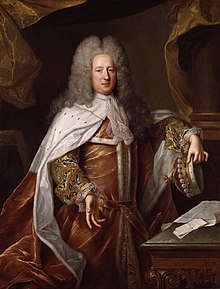



The Harley (or Oxford–Bolingbroke) ministry was the British government that existed between 1710 and 1714 in the reign of Queen Anne. It was headed by Robert Harley (from 1711, Earl of Oxford) and composed largely of Tories. Harley was a former Whig who had changed sides, bringing down the seemingly powerful Whig Junto and their moderate Tory ally Lord Godolphin. It came during the Rage of Party when divisions between the two factions were at their height, and a "paper war" broke out between their supporters. Amongst those writers supportive of Harley's government were Jonathan Swift, Daniel Defoe, Delarivier Manley, John Arbuthnot and Alexander Pope who clashed with members of the rival Kit-Kat Club.